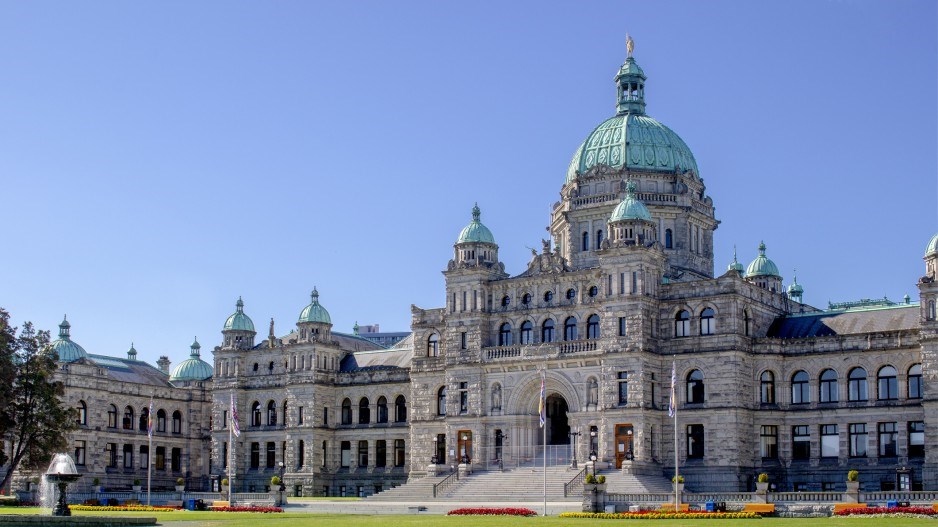More than six weeks after tabling the 2023 budget, B.C.’s NDP government paid an Ontario company nearly $80,000 to stage a pair of budget-themed telephone town halls on Monday and Tuesday, April 17 and 18.
But the discussion went beyond the annual financial blueprint and could be another sign the party is testing the waters for a potential early election, despite Premier David Eby frequently stating he will stick to the scheduled fall 2024 vote.
On Monday, Eby was joined by Finance Minister Katrine Conroy and Housing Minister Ravi Kahlon, who acted as emcee.
“Thirty thousand people – obviously, our numbers were helped a little bit by the Canucks not making the playoffs, so maybe that's a silver lining for everybody,” Eby mused at the end of the call.
Government Communications and Public Engagement (GCPE) said 150,000 phone numbers were texted or voice mailed at random two days before the event. Those that didn’t opt-out received a call at the event time. Others registered online, submitted questions and listened.
Eby’s chief of staff, Matt Smith, is former president of robocall and telephone town hall specialist Strategic Communications (Stratcom). GCPE hired Stratcom for six telephone town halls in early summer 2020 under the banner of “COVID-19 Recovery Ideas,” and paired cabinet ministers with MLAs from swing ridings.
In hindsight, it was part of the road to the snap election that resulted in the party winning its biggest majority under premier John Horgan.
The events this week, however, were conducted by PrimeContact Group, hired for $37,795 for each telephone town hall. According to its Facebook page, Hamilton, Ont.-based PrimeContact has experience working with the federal Liberal Party, the former BC Liberal Party and Liberal parties in Ontario and Nova Scotia. The company’s website says it worked to help elect “Canada’s most-infamous mayor,” Toronto’s late Rob Ford.
“This is a chance to make your voice heard and share your ideas, all from the comfort and convenience of your own home,” said the event website.
“Reducing the cost of living. Getting more affordable homes built, faster. Ensuring everyone has access to a family doctor. Creating jobs and opportunities in a clean economy.”
Eby came prepared with answers and talking points. Except, none of the questions were about the clean economy or environment.
Topics included housing supply and affordability, help for the homeless and Indigenous reconciliation, the doctor shortage, mental health and addiction services, and repeat violent offenders. One caller, introduced as Jake from Vancouver, asked: “Why the gas prices in Vancouver are the highest in the world, when Canada has so much natural resource in crude oil?”
Eby mentioned subsidies for electric vehicles and said that “using BC Hydro instead of gas” creates jobs and reduces pollution.
“But we know that that's not an option for everybody,” he said. “Although we do have high gas prices, the climate action tax credit, which is funded in part by taxes on gasoline, are refunded back to families, with a focus on higher refunds going to lower-income families.”
Asked about bringing down the cost of living. Eby mentioned the $100 credit on BC Hydro bills, flattening Insurance Corp. of British Columbia rates for the next two years, daycare subsidies and efforts to encourage the replacement of single-family housing with fourplexes.
Rambir from Surrey said there aren’t enough medical facilities in Surrey, causing long wait times for people needing treatment.
“I don't want to get too political, frankly,” Eby said.
“The difference between us and the Opposition BC Liberal Party is that when they were in government they sold the land the hospital was supposed to be on,” he said, referencing the newly rebranded BC United Party by its previous name. “So, if we had that land we would have been starting construction on this hospital much sooner. As it is, we got the land, construction is starting in July.”
When politicians wanted to speak to tens of thousands of British Columbians in the past, they went on a daily radio or TV talk show. For many years, Jack Webster was the go-to host on the West Coast, on CJOR and CKNW and later BCTV.
Technology, demographics and the media industry all changed, as filmmaker George Orr explored in his documentary, Talk! Vancouver’s Fascination with Grand Journalism and Instant Democracy. About the time that CKNW talkshow host Christy Clark returned to politics to become premier Christy Clark in 2011, telephone town halls were already gaining in popularity among political operatives. On telephone town halls, the politicians control the message and the audience.
Ohio State University political science professor William Minozzi and several colleagues explored the trend in the 2019 paper, Constituent Communication Through Telephone Town Halls: A Field Experiment Involving Members of Congress.
“Telephone town halls increasingly dominate the conversations that representatives have with their constituents, and, in retrospect at least, it is easy to see why,” said the study.
The interactive conference calls are a low-cost exercise, attracting more constituents than could attend an in-person event.
“Constituents who currently select into telephone town halls find them to be a useful communication platform, and they develop more positive evaluations of their representatives after participating,” the researchers found. “These results suggest why telephone town halls are so popular among members of Congress; they are an effective platform for MCs to reach many constituents at once and cultivate trust, approval, and positive impressions of MCs among participants.”
The study also cited New York contributor Charles Bethea’s 2017 critique of telephone town halls, that constituents listen to talking points recited from a Washington, D.C. office “in response to a small number of accepted, pre-screened questions. Many of these are softballs.”
The Indivisible Project went so far as to dismiss telephone town halls as “sham” events.




